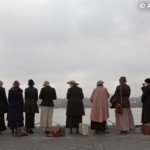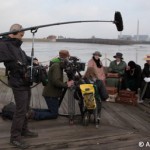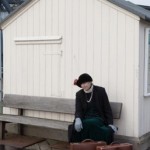After the 1919 Congress, the British Section organised educational meetings on such aspects of foreign policy as British imperialism, the blockade of Russia, the rights of India and of Ireland, German reparations, disarmament. In 1920 they organised the first of a long series of WILPF International Summer Schools.
In 1924 and 1929 Helena Swanwick, Chair of the British Section, was a member of the British Government’s delegation to the League of Nations. WILPF was the first and remains the only international women’s organisation accredited as a non-governmental organisation (NGO) with the League of Nations and today with the United Nations.
In the 1920s and 1930s, activity centred around a number of campaigning initiatives the Women’s Peace Pilgrimage of 1926; the Peace Crusade of 1928 for a “Parliament of Peacemakers”; the World Disarmament Petition of 1931-2; the League of Nations’ Peace Ballot 1934 -35 and the WILPF Peace Mandate.
The impressive 1926 Peace Pilgrimage was initiated by WILPF and involved twenty-eight women’s and peace organizations. Under the banner of ‘Law not War’ its objects were twofold: to press for a World Disarmament Conference; and to urge the British Government to sign the Optional Clause of the International Court of Justice.
The Peace Pilgrimage had seven main routes to London from the north of Scotland to Land’s End, from East Anglia to South Wales. A thousand meetings were held in towns and villages on the way. On 19 June 1926 the whole pilgrimage assembled at Hyde Park with a pageant, and from twenty-two platforms speakers supported the aims of the demonstration.
During the 1930’s the focus of the WILPF activities was on collecting signatures for the Disarmament Petition to urge the member states of the League of Nations to put some of their words into practice. Of the millions of signatures from men and women around the world presented at the Geneva Disarmament Conference in 1932, eight million signatures were collected by women’s organisations of which six million came from the WILPF. The Conference ended in 1933 with Germany not only withdrawing from the Conference but also from the League of Nations, foreshadowing all the horrors that were to follow.
.
In September 1939 at the outbreak of 2nd World War the International Chairmen wrote to national sections on 4 September: ‘WILPF work must go on-in spite of war’.
During the war the London office was evacuated but Annual Council meetings and monthly executive meetings continued. But because of WILPF’s continuing promotion of peace by negotiation it lost some members, many preferring to get involved with relief work or supporting the anti-fascist war effort. When the conscription of women was introduced in 1941, WILPF petitioned the Minister of Labour successfully to grant equal rights with men to women conscientious objectors.
The section organized joint conferences with other women’s groups on the Atlantic Charter; the Sankey Charter of Human Rights; the Beveridge Report on social
services and international control of Atomic Energy. The worsening relations of Britain and India increased pressure for the early granting of Indian independence. Direct communication with India was maintained through Agatha Harrison and Grace Lankester in England; and through Mrs Pandit, herself an international member of the League, on the other side.
After the war, when the Labour government secretly decided to develop its own atomic bombs, peace campaigning became associated with communism and was denounced and ridiculed. WILPF opposed the setting up of the North Atlantic Treaty Organisation (NATO) in 1949 but was wary of pro-Soviet organisations.
In 1955, the year of WILPF’s 40th Anniversary, Vijaya Lakshmi Pandit High Commissioner for India at the Annual Council was received. Phoebe Cusden called for an international conference of women on disarmament. The following year a Section luncheon honoured UK WILPF President, Professor Kathleen Lonsdale on being appointed a Dame. The 13th International Congress was held in Birmingham in 1956
The 1960’s saw the UK Section joining the Liaison Committee for Women’s Peace Groups a Committee set up to bring together the older peace organisations with the post-war groups. In 1969 WILPF held a conference in London on chemical and biological warfare.
In the 1970’s The International Congress returned to Birmingham in 1973 and the UN declaration of 1975 as International Women’s Year coincided with WILPF’s 60th Anniversary.
The 1980s were dominated with the campaigns about arms reduction including Greenham Common. In 1982 WILPF launches an international campaign “Stop The Arms Race” STAR which concluded with a mass rally on 8 March 1983 in Brussels demanding that NATO cancel the decision to deploy Pershing missiles. WILPF sections all over the world collected signatures for the STAR Campaign and presented petition signatures to NATO leadership.
This was followed in 1984 with WILPF launching a worldwide campaign for a Comprehensive Test Ban Treaty. At the UN “Women’s Decade Conference” Nairobi 1985, WILPF was a leader of the NGO Forum and coordinated the Peace Tent.
1995 saw several British members travelling on the WILPF Peace Train from Helsinki to Beijing. The Peace Train took its passengers across borders, through countries facing economic and social transition caused by conflicts and wars in neighbouring countries, to the 1995 Fourth World Conference on Women,
In 2000 WILPF led a coalition of organizations and convinced the UN Security Council to unanimously adopt Resolution 1325 on women, peace and security. This was the first time the Security Council directly addressed the subject of women and armed conflict. The implementation of UNSCR 1325 is an on going campaign for British members and at the international level WILPF’s Peace Women project advocates for its full and rapid implementation and monitors its use,
February 2003 saw British WILPF and members around the world joined massive protests in against the imminent U.S. invasion of Iraq. UK ‘Voices of African Women’ was launched in 2008, with a Parliamentary Forum at the House of Commons, a Chatham House Round table session and a Seminar addressed by women from six African countries.
Currently WILPF organises local meetings, national seminars, and works with other organisations. Members participate in public events, direct actions and rallies on a range of issues including campaigning against NATO, lobbying government about the Nuclear Non Proliferation Treaty, protesting about the upgrading of Aldermaston Atomic Weapons Research Establishment, lobbying about trafficking of women and all violence against women, and for trade justice and the blocking of Transnational Trade Investment Partnerships (TTIP).
2015 marked 100 years of WILPF. To celebrate, the Section in partnership with Clapham Film Unit secured Heritage Lottery funding to produce a documentary film, an exhibition, and booklet telling the history of the 1915 International Congress of Women, and the founding of WILPF.
In April 2015, WILPF members from across the world reassembled in The Hague for their Congress, followed by a three day international conference.





